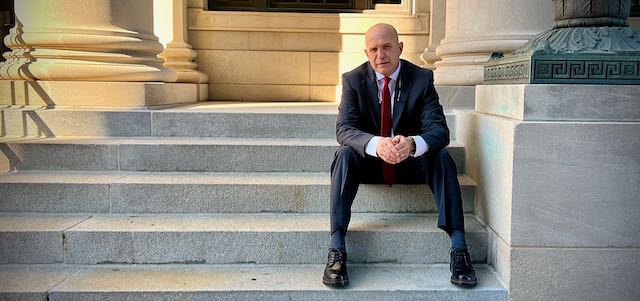Oklahoma Criminal Law

Kevin Adams - Criminal Defense Lawyer
Call 918 582-1313 for a free consultation
Explanation of Pardons in Oklahoma Criminal Law
What is a Pardon?
To pardon someone means to forgive or excuse someone for an offense. When someone is pardoned, what occurs is the Executive Branch is forgiving someone for a conviction that was imposed by the Judicial Branch. In Oklahoma, as with most states, the Governor has the power to grant pardons for people after conviction. This is a power granted to the Governor by Section 10 of Article 6 of the Oklahoma Constitution. However, in Oklahoma this power is not absolute. The Governor can only grant a pardon after the Pardon and Parole Board supports the pardon by a majority vote. This process is describe in Section 10 of Article 6 which is listed below.
10. Reprieves, commutations, paroles and pardons.
There is hereby created a Pardon and Parole Board to be composed of five members; three to be appointed by the Governor; one by the Chief Justice of the Supreme Court; one by the Presiding Judge of the Criminal Court of Appeals or its successor. An attorney member of the Board shall be prohibited from representing in the courts of this state persons charged with felony offenses. The appointed members shall hold their offices coterminous with that of the Governor and shall be removable for cause only in the manner provided by law for elective officers not liable to impeachment. It shall be the duty of the Board to make an impartial investigation and study of applicants for commutations, pardons or paroles, and by a majority vote make its recommendations to the Governor of all persons deemed worthy of clemency. Provided, the Pardon and Parole Board shall have no authority to make recommendations regarding parole for persons sentenced to death or sentenced to life imprisonment without parole.
The Pardon and Parole Board by majority vote shall have the power and authority to grant parole for nonviolent offenses after conviction, upon such conditions and with such restrictions and limitations as the majority of the Pardon and Parole Board may deem proper or as may be required by law. The Pardon and Parole Board shall have no authority to grant but may recommend parole for persons sentenced pursuant to Section 13.1 of Title 21 of the Oklahoma Statutes or the exceptions to nonviolent offenses as defined by Section 571 of Title 57 of the Oklahoma Statutes.
The Governor shall have the power to grant, after conviction and after favorable recommendation by a majority vote of the Pardon and Parole Board, commutations, pardons and paroles for all offenses, except cases of impeachment, upon such conditions and with such restrictions and limitations as the Governor may deem proper, subject to such regulations as may be prescribed by law. Provided, the Governor shall not have the power to grant paroles if a person has been sentenced to death or sentenced to life imprisonment without parole. The Legislature shall have the authority to prescribe a minimum mandatory period of confinement which must be served by a person prior to being eligible to be considered for parole. The Governor shall have power to grant after conviction, reprieves or leaves of absence not to exceed sixty (60) days, without the action of the Pardon and Parole Board.
The Governor shall communicate to the Legislature, at each regular session, each case of reprieve, commutation, parole or pardon granted, stating the name of the person receiving clemency, the crime of which the person was convicted, the date and place of conviction, and the date of commutation, pardon, parole or reprieve.
The Pardon and Parole Board shall communicate to the Legislature, at each regular session, all paroles granted, stating the names of the persons paroled, the crimes of which the persons were convicted, the dates and places of conviction, and the dates of paroles.
To apply for a pardon in Oklahoma a person has to begin by submitting an application to the Oklahoma Pardon and Parole Board. It is generally recommended that a person wait ten (10) years from the completion of the sentence before applying for a pardon. A person applying for a pardon does not need a lawyer to participate in this process.